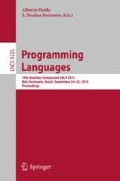Abstract
Complexity analysis is an important activity for software engineers. Such an analysis can be specially useful in the identification of performance bugs. Although the research community has made significant progress in this field, existing techniques still show limitations. Purely static methods may be imprecise due to their inability to capture the dynamic behaviour of programs. On the other hand, dynamic approaches usually need user intervention and/or are not effective to relate complexity bounds with the symbols in the program code. In this paper, we present a hybrid technique that solves these shortcomings. Our technique uses a numeric method based on polynomial interpolation to precisely determine a complexity function for loops. Statically, we determine: (i) the inputs of a loop, i.e., the variables that control its iterations; and (ii) an algebraic equation relating the loops within a function. We then instrument the program to plot a curve relating inputs and number of operations executed. By running the program over different inputs, we generate sufficient points for our interpolator. In the end, the complexity function for each loop is combined using an algebra of our own craft. We have implemented our technique in the LLVM compiler, being able to analyse 99.7 % of all loops available in the Polybench benchmark suite, and most of the loops in Rodinia. These results indicate that our technique is an effective and useful way to find the complexity of loops in high-performance applications.
Access this chapter
Tax calculation will be finalised at checkout
Purchases are for personal use only
Notes
References
Alves, P.R.O., Rodrigues, R.E., de Souza, R.M., Pereira, F.M.Q.: A case for a fast trip count predictor. Inf. Process. Lett. 115(2), 146–150 (2015)
Appel, A.W., Palsberg, J.: Modern Compiler Implementation in Java, 2nd edn. Cambridge University Press, Cambridge (2002)
Che, S., Boyer, M., Meng, J., Tarjan, D., Sheaffer, J.W., Lee, S.-H., Skadron, K.: Rodinia: a benchmark suite for heterogeneous computing. In: IISWC, pp. 44–54. IEEE (2009)
Coppa, E., Demetrescu, C., Finocchi, I.: Input-sensitive profiling. In: PLDI. ACM (2012)
Danielsson, N.A.: Lightweight semiformal time complexity analysis for purely functional data structures. In: POPL, pp. 133–144. ACM (2008)
Debray, S.K., Lin, N.-W.: Cost analysis of logic programs. ACM Trans. Program. Lang. Syst. 15(5), 826–875 (1993)
Dijkstra, E.W.: A note on two problems in connexion with graphs. Numer. Math. 1, 269–271 (1959)
Ferrante, J., Ottenstein, K.J., Warren, J.D.: The program dependence graph and its use in optimization. TOPLAS 9(3), 319–349 (1987)
Goldsmith, S.F., Aiken, A.S., Wilkerson, D.S.: Measuring empirical computational complexity. In: FSE, pp. 395–404. ACM (2007)
Graham, S.L., Kessler, P.B., McKusick, M.K.: gprof: a call graph execution profiler (with retrospective). In: Best of PLDI, pp. 49–57 (1982)
Gulavani, B.S., Gulwani, S.: A numerical abstract domain based on expression abstraction and max operator with application in timing analysis. In: Gupta, A., Malik, S. (eds.) CAV 2008. LNCS, vol. 5123, pp. 370–384. Springer, Heidelberg (2008)
Gulwani, S., Jain, S., Koskinen, E.: Control-flow refinement and progress invariants for bound analysis. In: PLDI, pp. 375–385. ACM (2009)
Gulwani, S., Mehra, K.K., Chilimbi, T.: SPEED: precise and efficient static estimation of program computational complexity. In: POPL, pp. 127–139. ACM (2009)
Lattner, C., Adve, V.S.: LLVM: a compilation framework for lifelong program analysis & transformation. In: CGO, pp. 75–88. IEEE (2004)
Le Métayer, D.: Ace: an automatic complexity evaluator. ACM Trans. Program. Lang. Syst. 10(2), 248–266 (1988)
Monniaux, D., Gonnord, L.: Using bounded model checking to focus fixpoint iterations. In: Yahav, E. (ed.) Static Analysis. LNCS, vol. 6887, pp. 369–385. Springer, Heidelberg (2011)
Nethercote, N., Seward, J.: Valgrind: a framework for heavyweight dynamic binary instrumentation. In: PLDI, pp. 89–100. ACM (2007)
Piccoli, G., Santos, H., Rodrigues, R., Pousa, C., Borin, E., Pereira, F.M.Q.: Compiler support for selective page migration in NUMA architectures. In: PACT, pp. 369–380. ACM (2014)
Pouchet, L.-N.: Polybench: the polyhedral benchmark suite (2012). http://www.cs.ucla.edu/pouchet/software/polybench/. Accessed April 2015
Wegbreit, B.: Mechanical program analysis. Commun. ACM 18(9), 528–539 (1975)
Wolfe, M.: High Performance Compilers for Parallel Computing, 1st edn. Adison-Wesley, Redwood City (1996)
Zaparanuks, D., Hauswirth, M.: Algorithmic profiling. In: PLDI, pp. 67–76. ACM (2012)
Author information
Authors and Affiliations
Corresponding author
Editor information
Editors and Affiliations
Rights and permissions
Copyright information
© 2015 Springer International Publishing Switzerland
About this paper
Cite this paper
Demontiê, F., Cezar, J., Bigonha, M., Campos, F., Magno Quintão Pereira, F. (2015). Automatic Inference of Loop Complexity Through Polynomial Interpolation. In: Pardo, A., Swierstra, S. (eds) Programming Languages. SBLP 2015. Lecture Notes in Computer Science(), vol 9325. Springer, Cham. https://doi.org/10.1007/978-3-319-24012-1_1
Download citation
DOI: https://doi.org/10.1007/978-3-319-24012-1_1
Published:
Publisher Name: Springer, Cham
Print ISBN: 978-3-319-24011-4
Online ISBN: 978-3-319-24012-1
eBook Packages: Computer ScienceComputer Science (R0)

